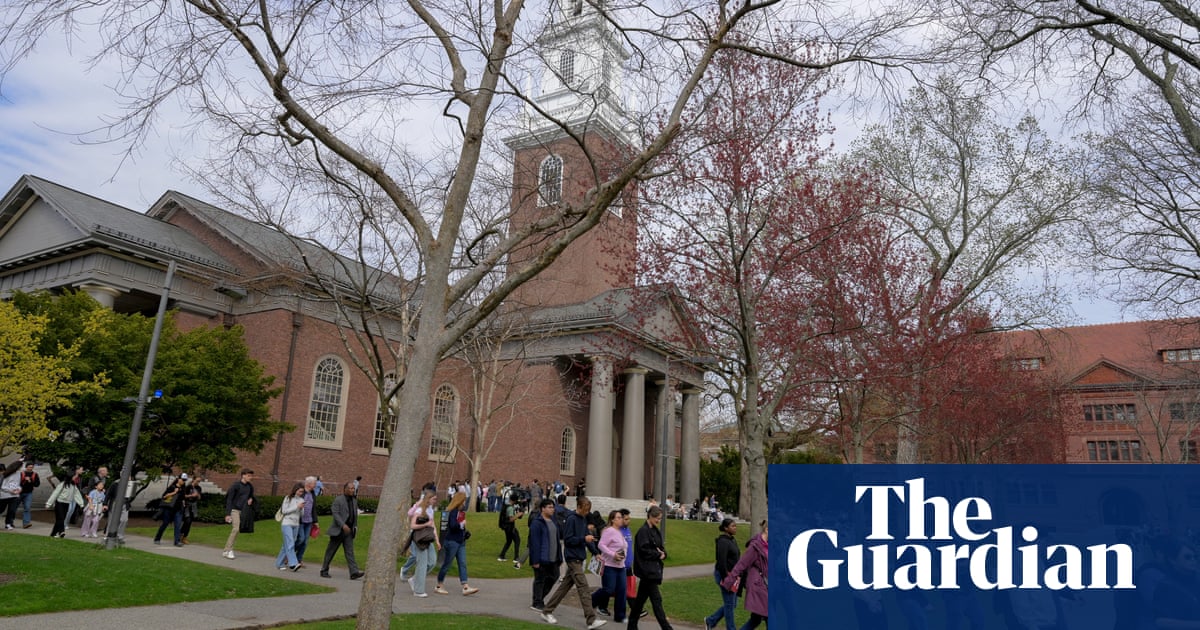Good morning.
The Trump administration has ordered US embassies globally to immediately pause scheduling visa interviews for international students as it prepares to introducesweeping social media monitoringfor these applicants.
The directive,first reported by Politicoand since confirmed by the Guardian, could severely hold up visa processing and hit universities financially.
The freeze is part of a further tightening of vetting policy, which has been primarily directed at students involved in pro-Palestinian solidarity protests. Since March, consular officers have been searching for proof of support for “terrorist activity or a terrorist organization”, which could be as broad as showing support for the Palestinian cause, according to acable obtained by the Guardian.
What does thismove mean?All student visa applications, rather than just those flagged for activism, will now have their social media combed.
What else is Trump doing with universities?The administration will order federal agencies to cut all ties with Harvard University,in afurther escalation of its assaulton the storied institution, which is expected to lose contracts worth an estimated $100m under the plans.
Saudi Arabia isimprisoning womenbanished by their families or husbands for disobedience in secretive institutions, with former prisoners telling the Guardian of weekly floggings, forced religious teachings and lack of contact with the outside world.
Conditions in the so-called “rehabilitation” facilities are said to be so terrible that there have been several cases of suicide or attempted suicide, and women are unable to leave without the permission of their family or a male guardian.
How long have they existed?The institutions, which officials describe as care homes, were set up across the country in the 1960s.
Global temperatures have an80% likelihood of exceeding annual heat recordsat least once in the next five years, research has found, while breaching 2C before 2030 is now a statistical possibility, albeit a tiny one.
Scientists described the 1% chance of exceeding the 2C mark as “shocking”. Far more likely, however, is that the five-year average warming for 2025-29 will pass 1.5C above preindustrial levels, which has been given a 70% chance. Rapid global heating is raising the risk of extreme droughts, floods and forest fires.
Has 1.5C been breached before?Yes, it was passed in 2024, the hottest year in the 175-year observational record, for the first time on an annual level.
A total of 380 writers and groups, including Zadie Smith and Ian McEwan, have signed a letter describing Israel’s war in Gaza as agenocideandcalling for a ceasefireand unrestricted distribution of aid.
California has changed itsrules for one particular sports competitionthis weekendafter Donald Trump posted online about a trans athlete participating and threatened to pull funding.
A French former surgeon is expected to be handed a 20-year sentenceon Wednesdayfor the sexual abuse of hundreds of child patients.
Levels of toxic pesticides in tampons sold in the UK are40 times higherthan the legal limit for drinking water, according to research. Traces of the pesticide glyphosate, which has been linked to cancer, have been found at very high levels in menstrual products, which is particularly concerning as chemicals absorbed in the vagina directly enter the bloodstream.
After Adele Zeynep Walton’s sister, Aimee, was found dead in a hotel room, apparently having killed herself, Walton started digging. She learned that her younger sibling hadspent time on a suicide forumthat taught her how to procure the substance that killed her, and that she had met a man who travelled from the US to accompany her while she died. “My feeling is that Aimee was groomed into making the decision,” Walton says of the influence of the online community and the algorithms that guided her.
In the US, you can call or text theNational Suicide Prevention Lifelineon 988, chat on988lifeline.org, ortext HOMEto 741741 to connect with a crisis counselor.
Groundwater is rapidly disappearing from the Colorado River basin, a key agricultural area: the basin haslost 27.8m acre-feet of groundwaterin the last two decades, research shows. This is almost equivalent to the full capacity of Lake Mead, the largest reservoir in the US. Global heating is expected to intensify water shortages.
Welcome to one of the internet’s more pleasant corners, where you can watch alivestream of baby eagles. For a decade, the environmental non-profit group Friends of Big Bear Valley has been livestreaming an eagle nest, and the family of eagles have become something of a hit, with 638,000 people subscribing to keep up to date with their goings-on. “What gets me through the day is to watch this beautiful family thrive,” reads one comment.
First Thing is delivered to thousands of inboxes every weekday. If you’re not already signed up,subscribe now.
If you have any questions or comments about any of our newsletters please emailnewsletters@theguardian.com
